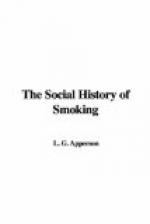It was about 1859 that the use of the root of the White Heath (Erica arborea), a native of the South of France, Corsica, and some other localities, for the purpose of making tobacco-pipes was introduced into this country. The word “brier” or “briar” has no connexion whatever with the prickly, thorny briar which bears the lovely wild rose. It is derived from the French bruyere, heath—the root of the White Heath being the material known as “briar” or “brier,” and at first as “bruyer.” The Oxford Dictionary quotes an advertisement from the Tobacco Trade Review of so recent a date as February 8, 1868, of a “Heath Pipe: in Bruyer Wood.” The briar pipe not only soon drove the clay largely out of use, but immensely increased the number of pipe-smokers. Bulwer Lytton may not have known the briar, but he wrote enthusiastically of the pipe. Every smoker knows the glowing tribute he paid to it in his “Night and Morning,” which appeared in 1841. It is terser and more to the point than most panegyrics: “A pipe! It is a great soother, a pleasant comforter. Blue devils fly before its honest breath. It ripens the brain, it opens the heart; and the man who smokes thinks like a sage and acts like a Samaritan.”
XI
LATER VICTORIAN DAYS
When life was all a summer
day,
And I was under
twenty,
Three loves were scattered
in my way—
And three at once
are plenty.
Three hearts, if offered with
a grace,
One thinks not
of refusing.
The task in this especial
case
Was only that
of choosing.
I
knew not which to make my pet—
My
pipe, cigar, or cigarette.
HENRY S. LEIGH.
The social history of smoking in later Victorian days is marked by the triumph of the cigarette. The introduction of the cigar, as we have seen, brought about the revival of smoking, from the point of view of fashion, in the early decades of the nineteenth century; and the coming of the cigarette completed what the cigar had begun.
The earliest references for the word “cigarette” in the Oxford Dictionary are dated 1842 and 1843, but both refer to the smoking of cigarettes abroad—in France and Italy. The 1843 quotation is from a book by Mrs. Romer, in which she says—“The beggars in the streets have paper cigars (called cigarettes) in their mouths.” The wording here would seem to show that cigarettes were not then familiar to English people.
Laurence Oliphant, who was both a man of letters and a man of fashion, is generally credited with the introduction into English society of the cigarette; but it is difficult to suggest even an approximate date. Writing from Boulogne to W.H. Wills in September 1854, Dickens says, “I have nearly exhausted the cigarettes I brought here,” and proceeds to give directions for some to be sent to him from London. This




